There is no place on earth that is steeped (pun intended, unfortunately) in more tea heritage than Yunnan province in the wild south-west of China. The forests on these mountains are the birthplace of tea where, about four thousand years ago, the indigenous tribes (Akha, Bulang, Dai, Jinuo, Lahu and Yao people) began enjoying the psychogenic and aromatic pleasures of a certain leaf. The word spread locally and this little leaf began its travels along ancient tea trading routes to other parts of China, Tibet and Mongolia. Eventually, the love for tea spread to every corner of the globe and altered the landscape, politics and customs of many nations.
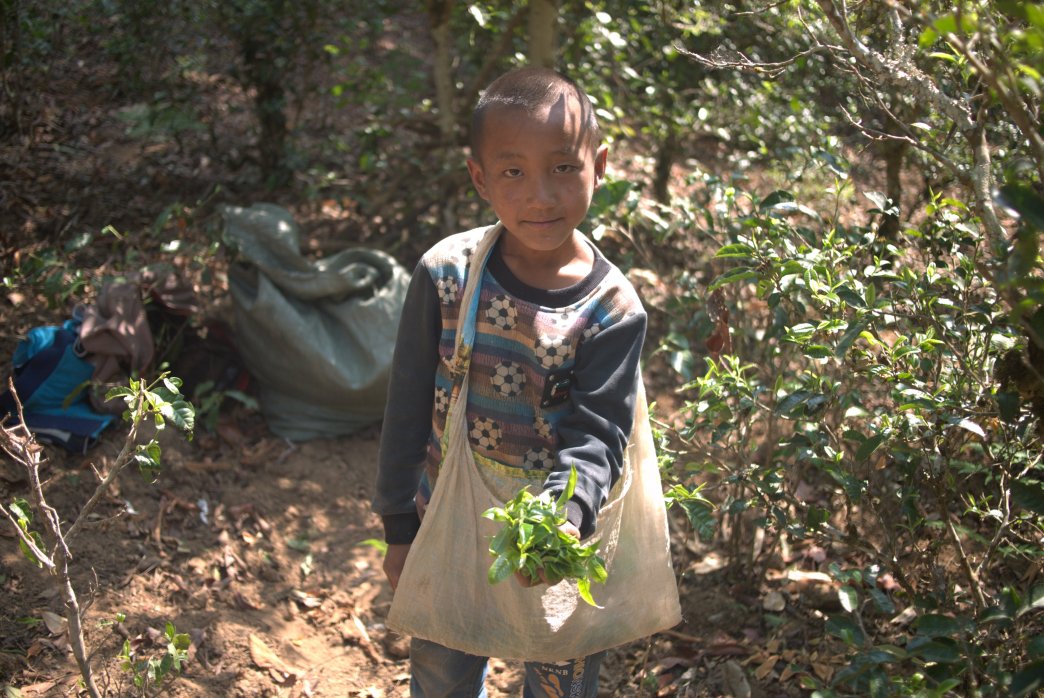
A boy and his leaves – Copyright Don Mei 2015
Tea may be the most ubiquitous of drinks consumed by people of every colour and culture on the planet but it is always worth remembering its deep roots as a tribal drink discovered by a handful of mountain people in the wilderness of Yunnan. This is where tea is from, both geographically and ideologically and it is a special pilgrimage whenever I go tea hunting in this corner of China.

A tea picker, her baby and her leaves – Copyright Don Mei 2015
I say China, but this is not China. It is so far away from the imperial majesty, state pomp or exhausting economic frenzy of the other parts of this powerful nation. Even when I compare Yunnan with the other rural tea mountain provinces of China, it feels different. It is wilder and less cultivated both in terms of landscape and attitude. This is no surprise since Yunnan is a frontier province on the edge of China, bordered by Burma, Laos and Vietnam. Only a few decades ago, the only way to reach Yunnan was by many days on an uncomfortable bus or by crossing the border by boat up the Mekong river.
Just like any good frontier land, Yunnan feels rebellious and independent. It continues to be an area rich in ethnic minorities with a vastly different culture to the ruling Han Chinese. Yunnan is just 150km away from the drug-fuelled history of the Golden Triangle and landing in Xishuangbanna (the tea capital of Yunnan) is like arriving in the wild west. Exciting, edgy and a little bit lawless.

Riding through Xishuangbanna – Copyright Celine Thiry 2015
Our hosts were Pu Erh tea farmers and our purpose was to taste our way through as many of their wares as possible. We were pretty successful and I will write a full post about the details of the incredible tea that we found but for this post I wanted to reflect on how tea really reflects its environment (or maybe vice versa).

Tasting in the Yunnan mountains – Copyright Celine Thiry 2015
Tea is considered in China to be the ‘essence of mountain’. As rain falls, the flavour of a mountain is revealed in the tea that it produces. But I think that tea is even more expressive. Tea grown and made according to the local traditions truly reveals the idiosyncracies of an area and its people.
Travel to Zhejiang in the East of China and you are surrounded with imagery of beautiful Hangzhou ladies with serene smiles performing tea ceremonies. The weather is cool and the land is gentle. The tea produced in Zhejiang is elegant, fresh and refined. Visit Wuyi and you find yourself surrounded by tea scholars with an intense pride of their vast tea knowledge. The weather is warmer and the terrain is rocky and intimidating. The resulting tea is deep, rich and bold, usually with a traditional bitter charcoal roast. Hop across the sea to Taiwan and you are met with picture perfect manicured landscapes and creative people with attention to detail and a desire to move things forward. Consequently, Taiwanese tea has clear, consistent and optimised flavour with a more experimental approach to cultivar hybrids.
Stepping off the plane in Xishuangbanna in Yunnan is like stepping into a secret land. The warm air is fragranced with an intense mix of sweet orchid and wet earth. The land is rich and fertile with an incredibly diverse ecosystem. But what is most striking is the independence of this province. There are no brands here, no intrusive marketing, no false imagery of photoshopped faces. This area has clearly been forgotten by all the marketeers trying to capture a share of the precious Chinese market.

Yunnan woman selling fruit – copyright Don Mei 2015
The result is a people without pretension who understand their life and their land. These are no-nonsense people who define the term ‘down to earth’. For them, traditional living is not an image to sell to tourists but just their way of life. And guess what? They seem incredibly happy and content. Cut off from the meddling influence of those who want to control by spreading fear and the brands that want to sell by spreading dissatisfaction, the people here are unflustered, smiling and harmonious. Throw into the mix, the distinct influence of Buddhism (remember that this area has strong ties to Tibet, Laos and Thailand) and you have a diverse group of people who value ‘being’ over ‘having’.
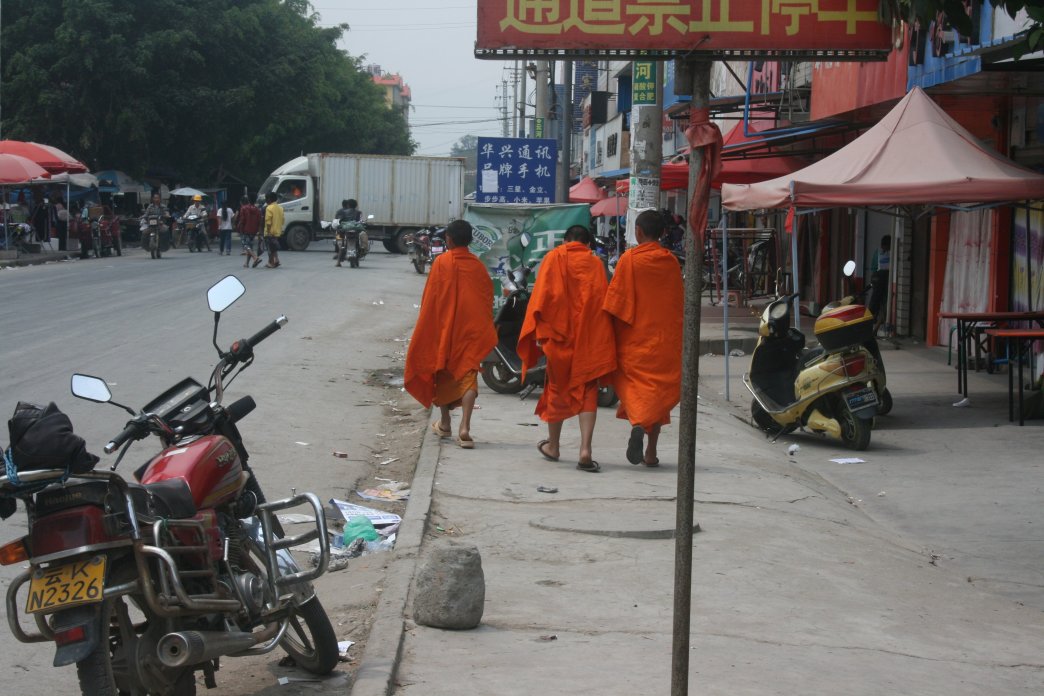
Buddhist students – copyright Don Mei 2015
The flipside of this coin is that this land is raw and undeveloped. You certainly do not come to the mountains of Yunnan for creature comforts like air conditioning or toilet seats (you sweat and you squat). There is no other tea province that I have travelled to that contrasts to my Western urban life more than Yunnan. As an example of this contrast, I would like to recount one particular evening in the mountains.
We had spent the whole day tasting tea (obviously) – strong shots of wild ancient tree tea that had us giddy and happy. By 6 pm we were hungry and so we made our way to a local Dai (ethnic group) household for dinner. We entered a house surrounded by free running chickens, walked up the wooden stairs onto a balcony with a feast laid out on ridiculously low tables and tiny, toddler-sized stools.
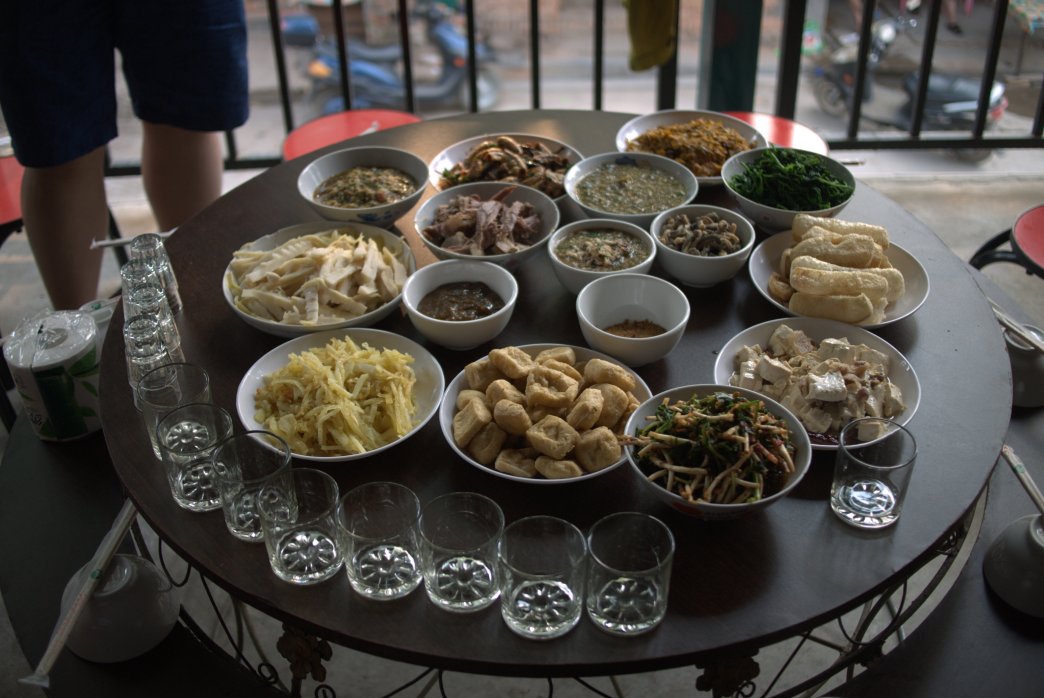
Dinner is served – copyright Don Mei 2015
Before eating, all the farmers began opening plastic bags and many bottles of moonshine appeared on the tables. This is a white liquor about 40% alcohol made from rice and wheat. In my journeys around tea provinces, I have come to realise that most tea farmers also brew up their own spirits so this was pretty standard. Shot glasses were handed out and the drinking commenced.
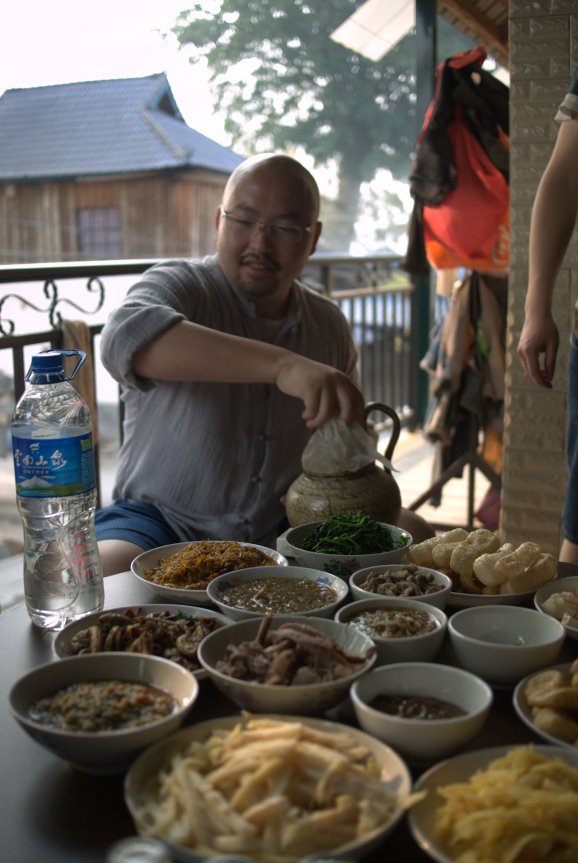
Breaking out the moonshine – Copyright Don Mei 2015
Whenever doing business in China there is an expectation that you will drink together. In my experience, the best way to shortcut business negotiations is to eat and get stupidly drunk. It is certainly juvenile but there is no quicker way to get to know someone’s character then seeing them out of control drunk and the Chinese use alcohol in this way to quickly decide if they can do business. So, whenever I go to China I expect the challenge of the dreaded ‘Ganbei’ – the invitation for you to down your drink. So, surrounded by a group of farmers who I had just met that morning, I realised that the glint in their eyes and the knowing grins meant one thing – let’s get the foreigner drunk and see what he is about.

That’s not water! – Copyright Don Mei 2015
This is how it usually works. One of your hosts will invite you to do a shot together to welcome you. Your glass is refilled in an instant and a minute later a different farmer will want to do a shot with you to honour you. Drink and repeat for all farmers and any other villagers who happen to be passing by. Therefore after about 10 minutes, everyone has done one shot except you who have done eight!

Our hosts having some moonshine – Copyright Celine Thiry 2015
Needless to say, after about half an hour and 10 shots of moonshine, Yunnan starting spinning so it was definitely important to eat. The menu was traditional Dai food and included delights such as boiled fern, flowers mixed with chilli, deep fried pork intestines, cow stomach, stinky fermented tofu, raw beef blood dip, pork blood noodle soup and ant larvae. Some of it was pretty good, other dishes were a bit of a challenge at first but after 15 shots it was just necessary to keep eating.
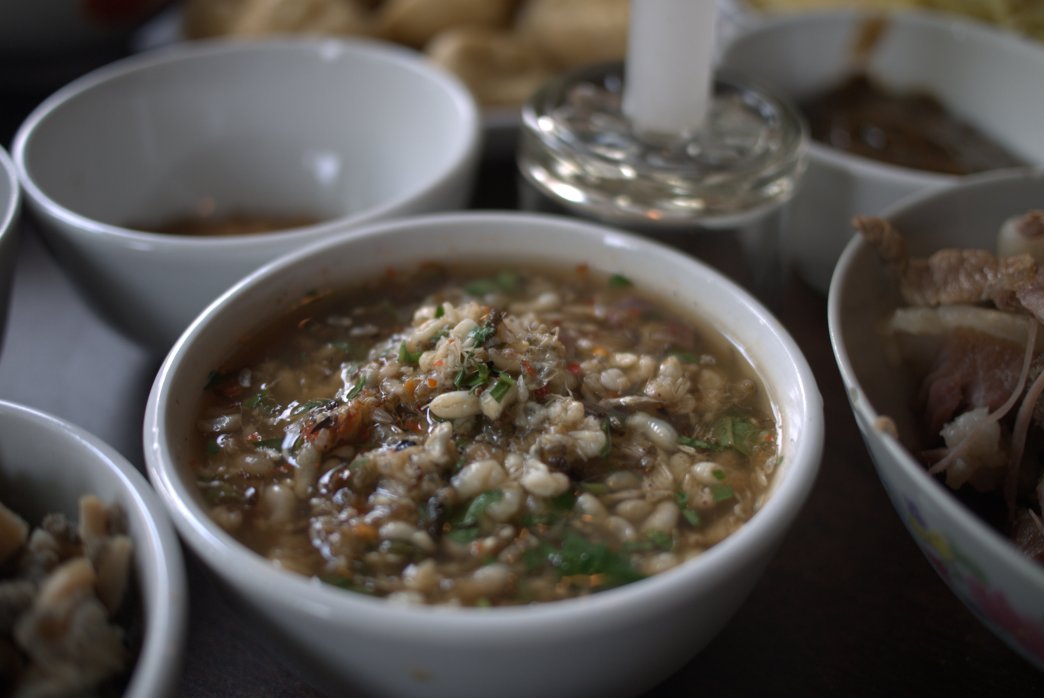
Ant larvae dip – Copyright Don Mei 2015
By 9pm everybody was too drunk to continue and we somehow (I am not quite sure how) found our way to a village inn to crash. At 3am I was woken by the sound of an out-of-sync cockerel who was determined to get us all up. I was in a rock hard bed in a small room next to a farm with a toilet consisting of a squat hole with a shower above it (no problem peeing in the shower then). I tried to sleep but kept on being woken up by the cockerel and the loud screaming of pigs seemingly being slaughtered. Not the best night of my life. At 7am I got up and stared out at the mist covered forests and I realised in my hungover haze that the previous night perfectly encapsulated why I love Yunnan tea. It is wild, raw, local and unrefined and yet rich, memorable and unique.
In the same way as wine has the ‘fruit driven’ new world and the more ‘terroir driven’ old world, there are distinctive schools in tea making. China is the old world of tea but Yunnan produces the oldest of old-world tea. It celebrates the taste of the earth, the mountain and the single tree rather than producing a standardised populist flavour. It shuns any contrivance which manipulates the flavour to be more fruity, more floral or more creamy and instead relies on wild nature and time to do the work. This is organic, ecological, biodiversity farming, but these people have no knowledge or concern for these marketing buzzwords – this is just the way that it has always been done and it makes good tea.

Ban Po Mountain Sheng Pu Erh 2015 – Copyright Celine Thiry 2015
Yunnan Pu Erh is gloriously ‘rough around the edges’, it is unapologetically brisk, strong and potent. It is in some ways pure simplicity – a green assamica. But in other ways, it is so incredibly nuanced. Which mountain? How old is the tree? Is it raw or cooked? How long has it been aged for? These factors have a big effect on taste. The ‘strong tea’ flavour of the tea itself transforms on the tongue to reveal incredible complexity as you drink – sweet, earthy, humid, floral, savoury. The glory of nature without human interference is expressed in the cup.
Tea lovers may metaphorically travel the world to taste everything but in my experience, they will eventually come home to Yunnan. This is because the tea, just like the people and the environment, is so powerful and independent in its simplicity and tradition.
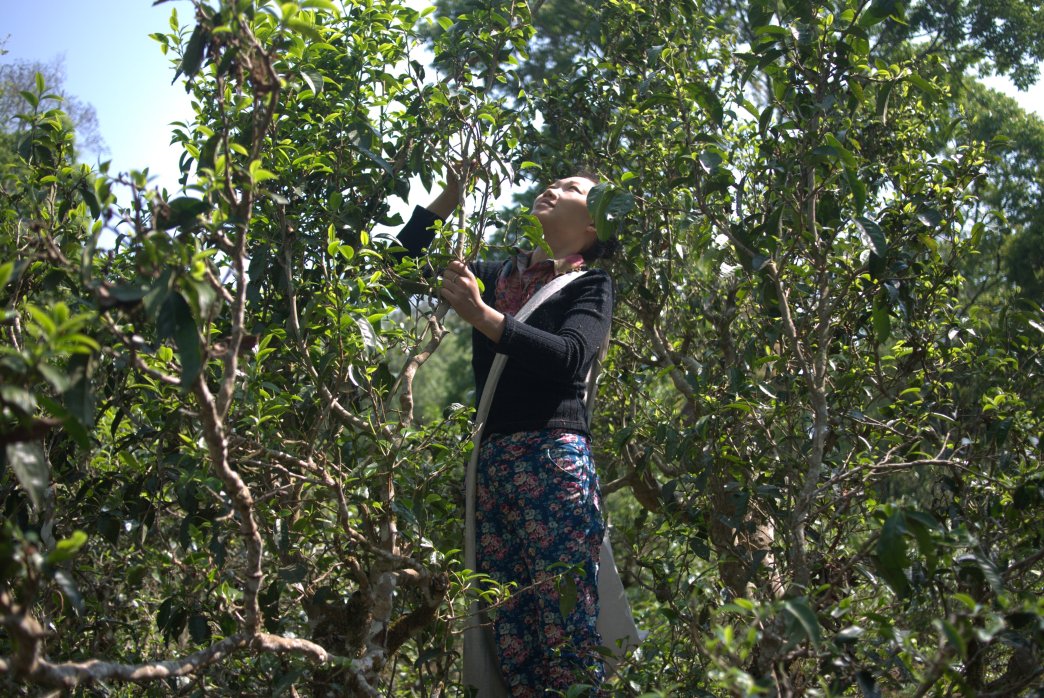
Bulang woman picking tea from an ancient tea tree – Copyright Celine Thiry 2015
The next day I walked for hours in the ancient tea forests and then watched as families sat around their homes sorting through mountains of leaf. A farmer stuffed a few handfuls of his tea in a plastic bag and handed it to me as a gift. No business card, no brand, no packaging, just leaf in a bag without a thought in the world of selling it. On my return to the UK, it turned out to be one of the best teas that I have ever tasted. Ever. At first, I was frustrated that I did not get the farmers name but in a way, it seemed fitting.
As the popularity of Pu Erh tea increases, I truly hope that Yunnan does not get overrun with marketeers and brands and I will try my utmost not to play any part in the corruption of this beautiful frontier province. I love knowing that the best tea in the world is not on the menus of expensive hotels being sipped by the wealthy but is being brewed by a happy, unpretentious farmer in a mountain hut accompanied with a cheeky shot of moonshine.
Long live Yunnan – the heart of real tea.

Local family sorting tea – Copyright Don Mei 2015






